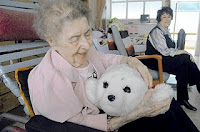South korea schools are lack of English teachers, so they used to hire foreign teachers, but korean people don't trust them because they accuse foreigners of being promiscuous (They even have to take and AIDS test if they want to enter the country) as a solution for this issue, Korea has invented robot teachers called Engkeys.
 Engkeys are 3-foot tall egg-shaped devices developed by Korea Institute of Science of Technology (KIST) which display an occidental woman face on a screen. This robot is controlled by English teachers in the Philippines, who can observe the class from another place and students will hear them and the robot will even copy teachers' reaction, thanks to cameras watching his or her face. Besides reproducing what the teacher is saying, these machines have software programs that allow them play educational games and sing songs with the kids, as we can see in the video:
Engkeys are 3-foot tall egg-shaped devices developed by Korea Institute of Science of Technology (KIST) which display an occidental woman face on a screen. This robot is controlled by English teachers in the Philippines, who can observe the class from another place and students will hear them and the robot will even copy teachers' reaction, thanks to cameras watching his or her face. Besides reproducing what the teacher is saying, these machines have software programs that allow them play educational games and sing songs with the kids, as we can see in the video:Engkeys have been well received by the children, who have declared that they feel more confident talking with a robot than with a present teacher and they feel more curious to learn. Obviously authorities have been pleased with this invention too, because hiring a long distance teacher is much cheaper than bring him/her to the country.
This is definitely a good invention, especially because there is still a human controlling it, but it is at the same time a tool to make discrimination even bigger.
What do you think about this? would you like to have a talking robot in the classroom instead of a real person?



